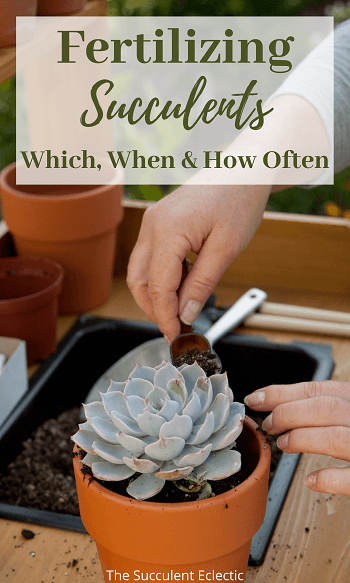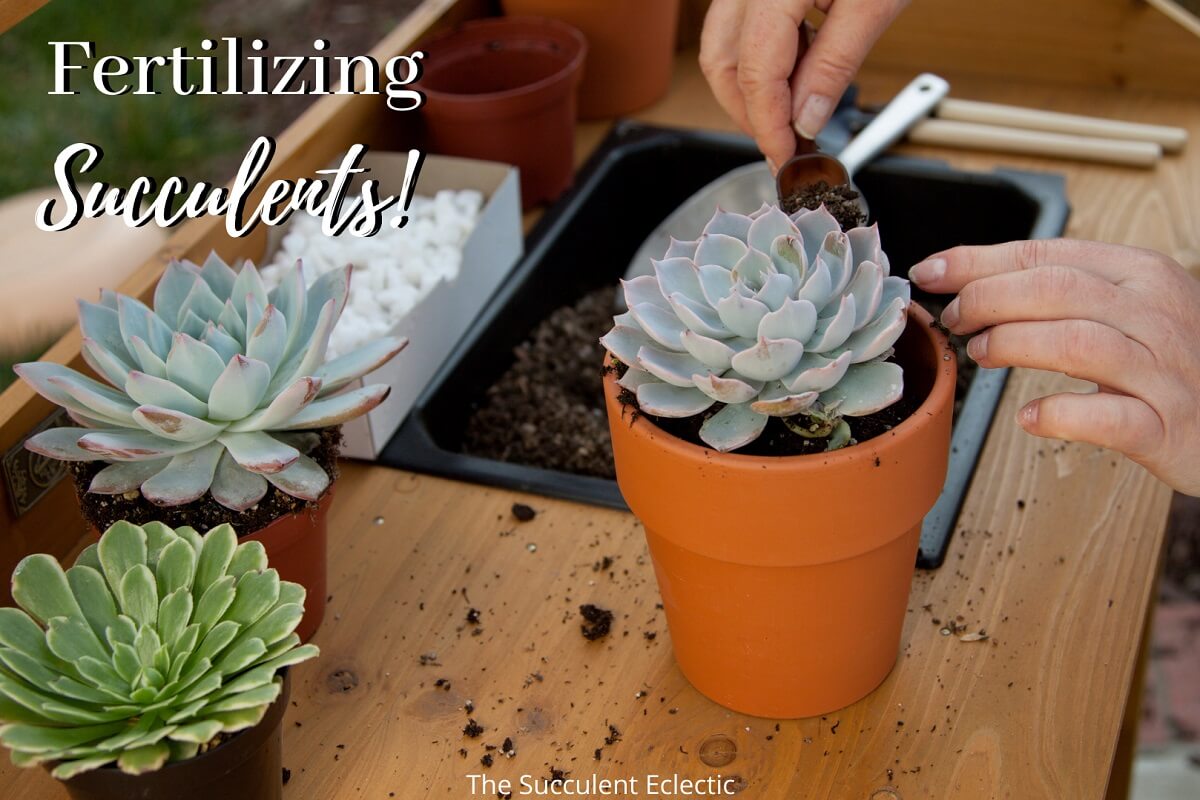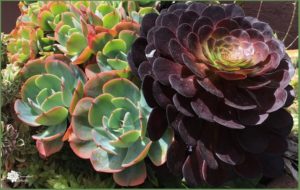One of the (many) reasons people love succulents is that they are so easy to grow with little care. But low care is not the same as no care. Although these charmers survive with little water, succulents do need proper watering. And though they are adapted to nutritionally lean soil, succulents do appreciate the right amount of fertilizer at the right times. Their exceptional adaptation to low nutrients means it can be easy to over-do it when it is time to feed. With the right nutritional support, your succulents will thrive! Let’s look at some options for succulent fertilizer and how best to use them.
Best Fertilizer for Succulents
In this Post We'll Cover:
{Please note, some links in this post may be affiliate links to sites that pay me a small commission if you click on the link and make a purchase. This commission is at absolutely no cost to you. I only recommend products and companies that I have worked with and truly love! ~Kat}
Do Succulents Need Fertilizer?
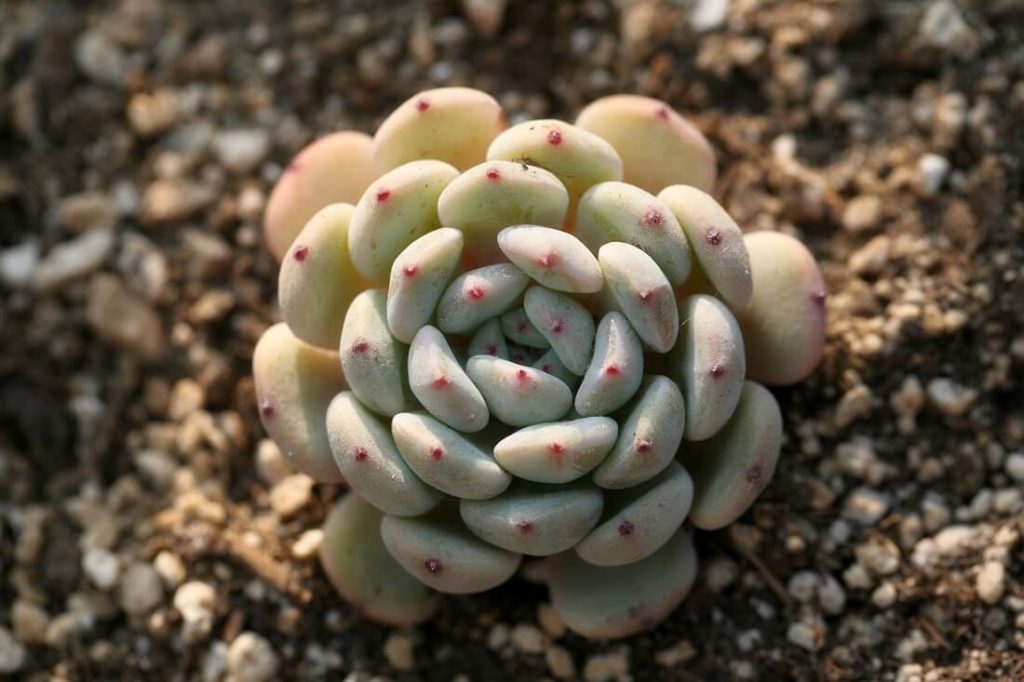
Do succulents need fertilizer? Strictly speaking, no. Your succulents will certainly survive without you feeding them. But the right fertilizer will provide a boost of nutrients that will make your succulents healthier with fuller, more abundant growth. With sufficient nutritional support, succulents grow more quickly, bloom more fully and have more perfect form. They are also better able to respond to environmental stresses and to withstand pests. With a light fertilizing, your succulents will truly thrive.
Feeding Succulents
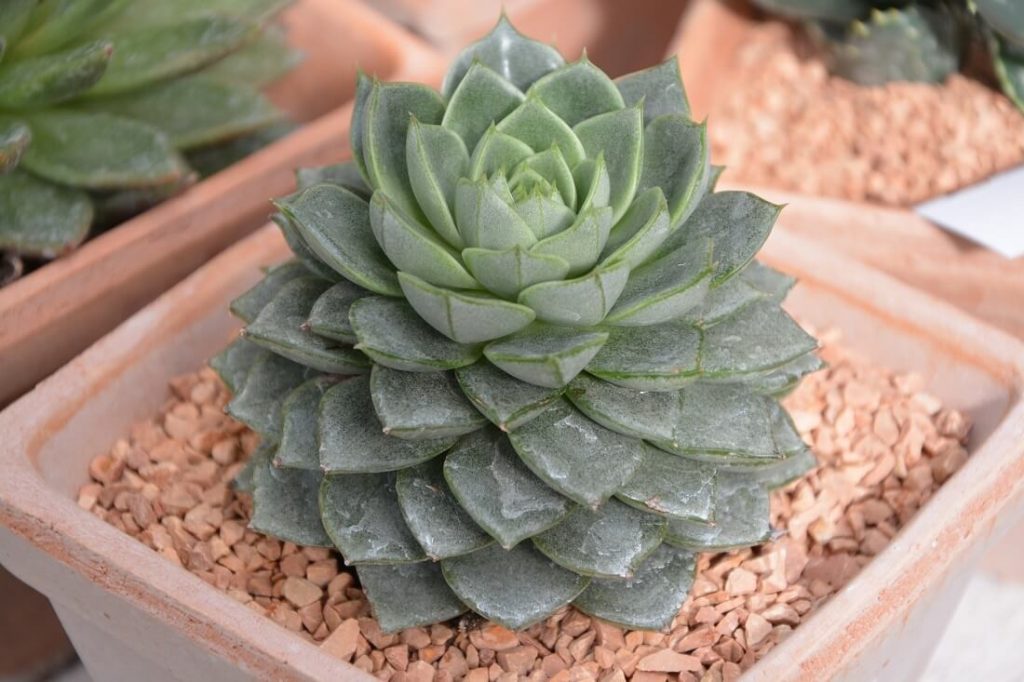
Feeding succulents is as much about what not to do as it is about doing it right. Some chemical plant food is likely to burn succulents or even cause scarred or misshapen leaves, unless it is diluted to a quarter-half strength of the general recommended dosage. I prefer to go with a mild organic solution that is rich in micronutrients. An organic fertilizer supplies your succulents with the broad array and low levels of nutrients they need to thrive, while feeding the soil they grow in.
I fertilize all of my succulents, those in the ground and those in containers. I’ll show you my favorite succulent fertilizer treatments.
Benefits of Manure for the Garden

Nature is so clever to have the manure of grazers replenish the land where they drop it. Well-composted manure from a variety of grazing animals like cows, horses, sheep and chickens has long been recognized as a boon to garden soil. It is rich in an array of micronutrients and minerals. These feed the microorganisms in the soil that are so critical to the health of your plants. Manure increases the soil’s aeration and is a premium soil conditioner. It also makes the soil’s carbon content more accessible to the plant. It is a wonderful amendment that nourishes and revitalizes the soil and promotes larger and lusher plant growth.
However, not all grazers are created equally, and neither are plants. While well-composted horse manure may be a boon to vegetable and ornamental gardens, it is not a wise choice for succulents! Horse manure contains a bacteria that leads to mycoplasma infection, which causes cracked, scabbed leaves on succulents. There is no effective treatment.
Well-composted cow manure is a great choice for succulent fertilizer.
Fish Emulsion for Succulent Fertilizer
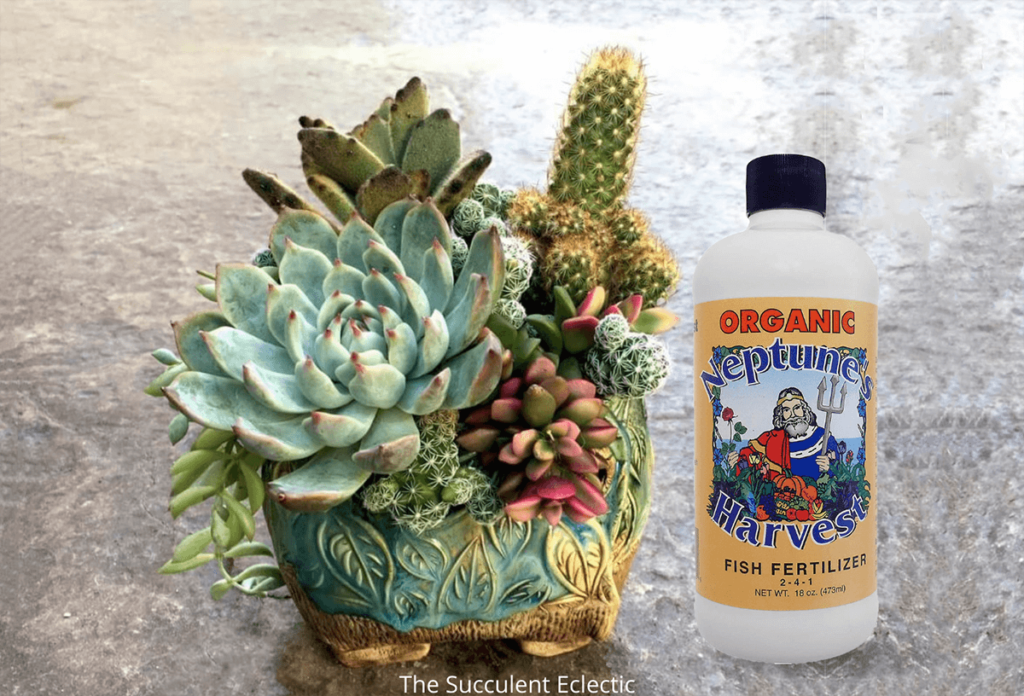
Organic fertilizers that feed the soil are an ideal approach for fertilizing succulents. Rather than risk burning your succulents with chemical fertilizers or simply overwhelming these ideally adapted plants, low and slow is the best way to feed them. One of my favorite ways to feed all of my garden plants and especially my succulents is with fish emulsion.
Fish emulsion is a fast-acting organic liquid fertilizer made from whole fish or fish byproducts. Iy provides an NPK ratio of 4-1-1 and is rich in micronutrients. Remember being taught in the 4th grade that Native Americans taught the pilgrims to but dead fish at the base of their crop plants? This is the same idea. I particularly like Neptune’s Harvest. It includes the fish proteins and oils found in the very best fish emulsions, but not the fishy odor! Win-win! My succulents love this! Always shake the bottle well. Then, add just 1 Tablespoon of the fish emulsion to a gallon of water., Stir thoroughly, and water well. Don’t fertilize succulents when the soil is bone dry. Instead, feed when the soil is stull slightly damp.
Most of my plants get fish emulsion tea once each month. Because I grow my succulents “hard”, I plan on just three regular feedings each year with the fish emulsion. Once in the early spring to get them ready for the growing season. Once in June, before the high heat of summer sets in. Then again in late summer / early autumn after the heat of summer has broken. If you want to treat your succulents to more frequent feedings, you can use fish emulsion once each month, including for indoor plants or those over-wintered indoors. For those gardening in cold winter climates, I recommend feeding your in-ground sempervivum and cold-tolerant sedums and opuntia in early autumn, to give them a great jump on the cold season to come.
The Benefits of Worm Castings in Your Garden
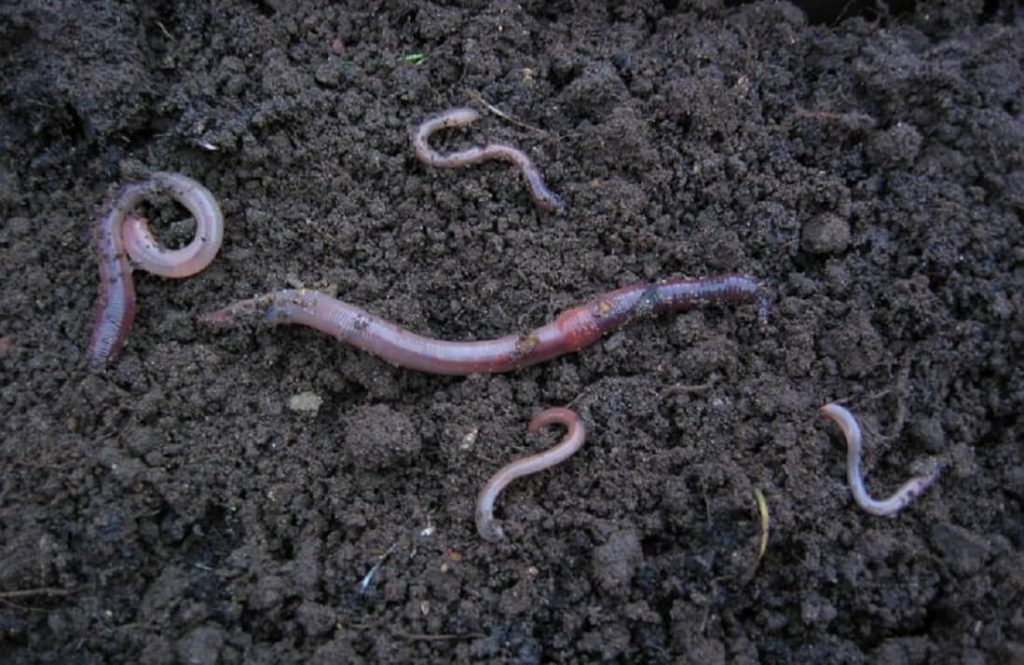
There is one other form of manure that is an exceptional organic fertilizer I use for my succulents — and all of my plants get it. Worm castings are the waste product of earthworms – essentially worm manure. It is an invaluable soil amendment for gardeners. Everything you grow, from vegetables to roses to fruit trees to succulents, benefits from an application of worm castings. The benefits include:
- Worm castings are rich in over 60 different micronutrients and minerals, including potassium, carbon, iron, copper, zinc, magnesium and calcium in addition to nitrogen, phosphate and potash.
- The use of worm castings will balance out high or low soil ph, allowing the plants’ roots to take up the nutrients they need.
- It is rich in humus and improves the aeration of the soil and the nutrition of beneficial micro-organisms, boosting the health of the plants.
- Worm castings fix heavy metals in the soil, preventing the plant from absorbing too much of these compounds, which could otherwise prove toxic.
- Worm castings contain enzymes that will repel many pests, including whiteflies, mealybugs and aphids.
Worm Castings for Succulent Fertilizer

Like fish emulsion, worm castings are rich in micronutrients and result in stronger, healthier plants. But there is an added benefit I just love, especially for a succulent fertilizer. Worm castings are rich in an enzyme called chitinase. This enzyme breaks down the chitin in an insect’s exoskeleton. As the succulent takes in the chitinase through its roots and distributes it throughout the plant, it becomes quite resistant to mealybugs, whiteflies, aphids and other leaf-sucking pests. They sense the presence of the chitinase and avoid feeding on it, to avoid their own damage and death. Yet beneficial insects like ladybugs are not harmed, because they do not feed on the plant. My favorite pest control is one that prevents the problem!
When I plant my succulents, either in the ground or in a container, I add dry worm castings directly to the soil, and mix it in. In a small pot, I add a couple tablespoons of the worm castings. For a large pot or for a plant in the ground, I add a couple handfuls of the worm castings. You can also make a tea of worm castings to use as a soil drench or as a foliar spray. This is a great option for both feeding your plant and fighting an infestation of mealybugs or whiteflies. This way, my plants have an excellent succulent fertilizer and protection from pests, 24/7.
How to Use Succulent Fertilizer
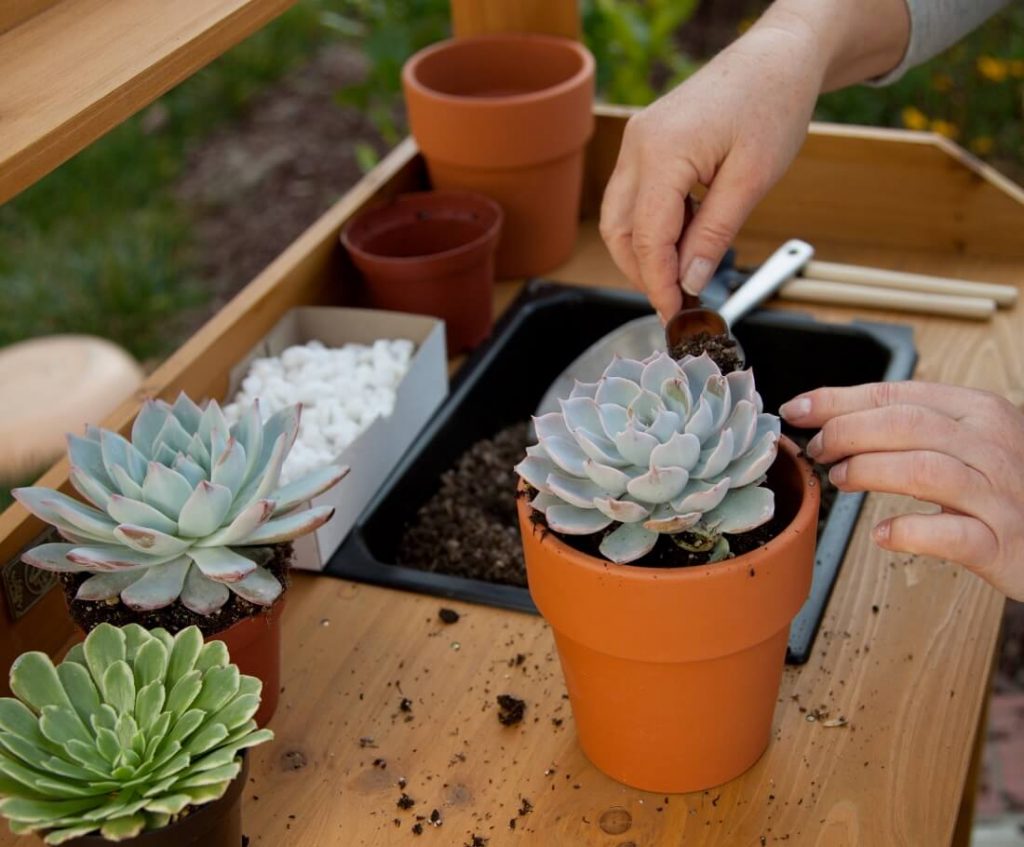
My personal approach to succulent fertilizer is to use worm castings and fish emulsion. I add worm castings to the soil when I plant my succulents. You can also add worm castings to established plants as a top dressing. Just scatter the worm castings on top of the soil from the base of the plant to the “drip line” or the edge of the plants’ foliage. Lightly scratch the worm castings into the soil then cover with an inorganic top dressing. The results are happy, healthy succulents highly resistant to pests. Beautiful! Next, I provide fish emulsion at least three times a year, in the early spring, early summer and fall. Adjust the timing to suit your climate.
How often should you fertilize your succulents? You can use a succulent fertilizer as often as once each month. Commercial growers feed this often, to ensure the largest, lushest plants in the shortest period of time. However, any plant grown in consistently perfect conditions tends to be less capable of surviving when conditions are less than perfect. In the gardening trade, this is known as growing plants “soft”. This is why so often a beautiful plant from the nursery just doesn’t truly thrive in your garden.
Environmental stresses are a part of life. While I do feed my succulents, I do not baby them. I want them fully capable of surviving the stress that comes their way, either from crazy heat waves, a clumsy cat knocking over a container or my own imperfect care. That is why I grow my succulents “hard”, with far fewer applications of organic fertilizer than they might ideally like. But for show-quality succulents, aim for using succulent fertilizer once a month.
Choose Organic Succulent Fertilizer Carefully

The saying goes, “you are what you eat”. This is just as true for cows, fish and worms – and their manure – as it is for us. I prefer to know that the fish and worms that provide manure and emusion for my garden were raised organically, free of pesticides, herbicides and hormones. If this is important to you, read the labels carefully to verify the conditions under which the product was developed and harvested. Then you will have a succulent fertilizer perfect for your needs. You can count on Neptune’s Harvest and Dr. Verm’s Premium Worm Castings.
Should You Use Succulent Fertilizer Indoors?
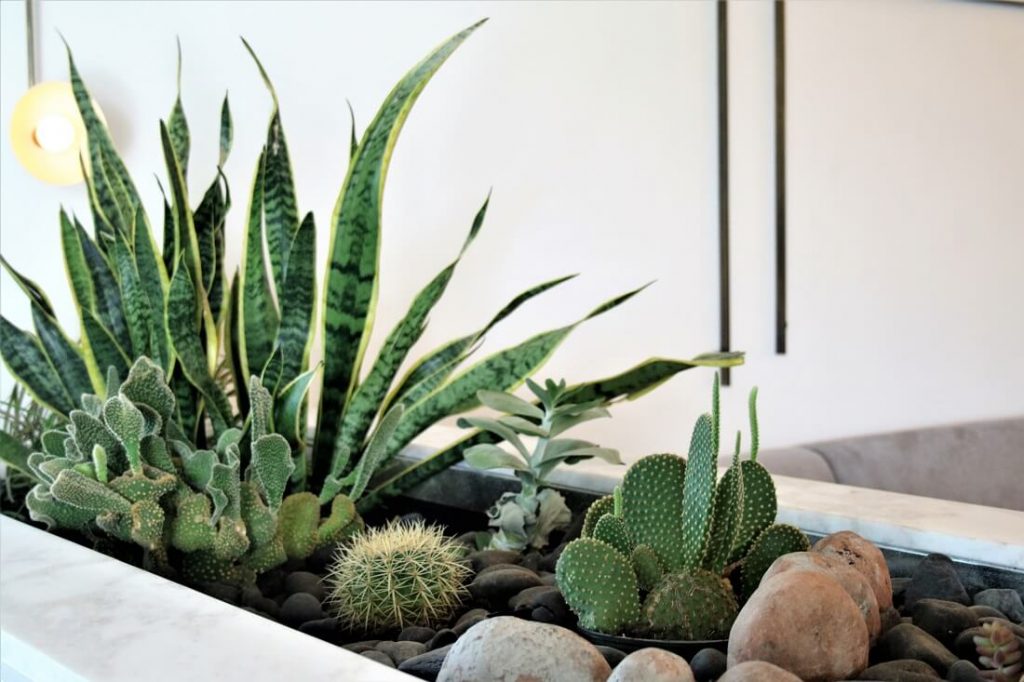
Your indoor succulents will appreciate a feeding of fish emulsion (choose odor free!) or worm castings, too, responding with more vigorous growth. But consider your plant and its growing environment before you feed them. If you have abundant light, by all means, give your indoor succulents a boost with the organic tea. However, if your plants are etiolated – stretching as a result of low light, remember that this organic food will spur faster growth. It will not compensate for the low light but will encourage more stretching, faster. If you plan to give your indoor succulents a summer vacation in bright, indirect light outdoors, then definitely give them a good drink of fish emulsion or worm castings a couple of days before you move them.
To Your Succulents’ Good Health!
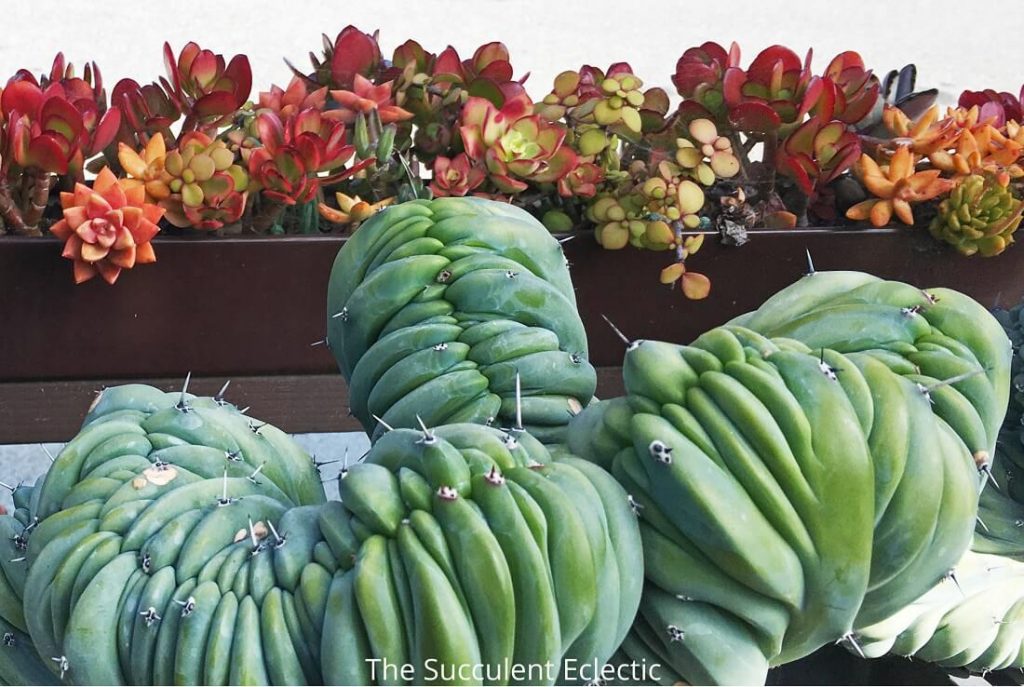
Thanks for reading my post on succulent fertilizer, or my Ode to Manure. 🙂 If you have any questions, please take a moment to leave a comment. I just love it when I hear from you! And I would love to know what you feed your succulents. I learn from all of you, too!
‘Til next time,
Happy Gardening!

P.S. For my FREE course on succulent care, 7 Steps to Succulent Success, please subscribe! Thank you!
P.P.S. Why not join my Facebook Group for succulent lovers? We talk about succulent care, propagation, succulent identification, and design. It’s a warm and welcoming group that would love to meet you!
